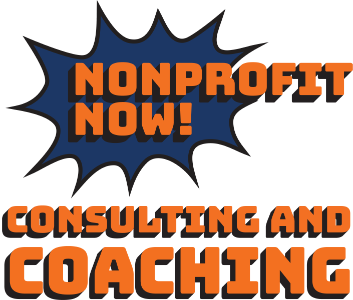|
I was recently coaching a new and very enthusiastic client that literally received her 501(c)(3) designation the day before our meeting. I was also excited that she had just received her first donation as well - off to the races! She had gathered lots of research, had a multitude of tasks and she was ready to dive into all of them.
As has become customary for me, I asked if she had a budget and could she tell me about the board of directors she had assembled. The room got noticeably quieter. I hadn’t asked her to shame or embarrass her but it was clear that she hadn’t quite gotten to those. I suggested that before anything else she focus on a Budget and her Board. I then joked that I wished I had a third B so I could suggest focusing on The Three B’s. Without missing a beat, she suggested Branding! Loved it! I’m guessing a few of you - or even many of you - may argue in favor of other areas besides Branding. You may even question my other B’s. But in a world where simplicity can help, putting ideas and activity into short and memorable arrangements can help. So perhaps you’ll find thinking of The Three B’s helpful in your work whether it’s launching and building a nonprofit or other businesses - here’s a bit more on all of them:
Hope you found these quick tips helpful. If you need help building your Brand, Budget and Board, I’m happy to help. You can reach me by phone at 917-733-8569 or my email [email protected]
0 Comments
My life as a stockbroker back in the 90s provided me with some of the best training ever. One of the most important lessons came early on as I was struggling to build my book of business. My job was simple: cold-call 300 prospective clients a day, grab their attention in 10 seconds or less, make a pitch, and CLOSE THE SALE. Fortunately, that industry has evolved to cultivating relationships and understanding a client’s needs. There are in fact, some parallels to what we do in the charitable sector however we use kinder, gentler terms like outreach, engagement, presentation and securing the commitment.
Anyway, after three months and a degree of success, my sales manager asked me to do a presentation to the other trainees about what I did every day. I was surprised as I didn't think I was particularly good at the job. I didn't fit the description of that mythical figure, the "born salesman." When I looked around the room, I saw infinitely better salespeople: smooth talkers, closers and pros - some of them were so good that I was ready to buy from them! I asked my manager why he wanted me to give that kind of talk. I just did the same thing every day: I dialed the phone, tried my best to get someone on the line who would listen (preferably a decision maker), talked about a mutual fund I thought was cool and asked them to buy it over and over until they bought it - or hung up on me. He said "Exactly! You're Boring! That's the key to success in this industry." As fundraisers, considering the myriad of ways we can distract ourselves from the core part of our job, I’m thinking we could all use a bit more "Boring" in our lives. As I sit down at my desk each morning, I’m flooded with opportunities to NOT find new prospects and donors to talk to: podcasts, trainings, meetings, webinars and the list goes on and on. Boring works - and I'll dare to say that it can even trump inbred talent and all of the aforementioned training tools - when applied consistently. Here's why boring worked then and still does: I had a plan to follow: I started my career at Smith Barney, a big "white shoe" firm. They crunched the numbers to be sure the right person was taking up a sales desk. They knew what it took to be successful after years of experience and calculations. It was simple - if you made 300 calls and presented to at least 10 prospects, you'd open one account. You just needed to do that X number of times to get your desired number of clients. I was passionate about my products: I opened all my accounts with a mutual fund that leveraged the massive consolidation that, at the time, was going on in the banking industry. I did this because I understood it, found it easy to explain and could describe it in about 15 seconds. It didn't matter if I was on the phone, at the deli, the gym or wherever - I loved talking about it and did so with anyone that would listen. I did the same thing every day! How many of us start each day with a plan? How many of us just wing it and see what happens? Unlike today where salespeople have tools to keep us on track (or create distractions depending on how you use them), there was only one approach to getting my business started: finding prospects and converting them. No facebook or email to check, no tweeting or instagramming - just talking to people about what you’re passionate about. All the time, not just on the clock. While I recognize this approach may be nostalgic (it was the 90's - remember them?), I think much of this still applies to our work in the charitable industry. You still need a game plan for meeting new donors and that should be part of your work every day. In terms of passion, it's pretty simple - find yours! If you're working with a nonprofit that doesn't get you excited every day, there are thousands of others that would welcome your support. We work in an industry where we get to change the world - one of the best ways to do it is be wonderfully "Boring." If you want some help figuring out to be at least a little bit boring, let’s talk! You can reach me by email at [email protected] or phone at 9177-733-8569. |
AuthorRobert Grabel is the President of Nonprofit Now! You can find his posts here and at www.robertgrabel.com Archives
October 2021
CategoriesWant to keep getting the latest New Thinking? Click Below...
|


 RSS Feed
RSS Feed
